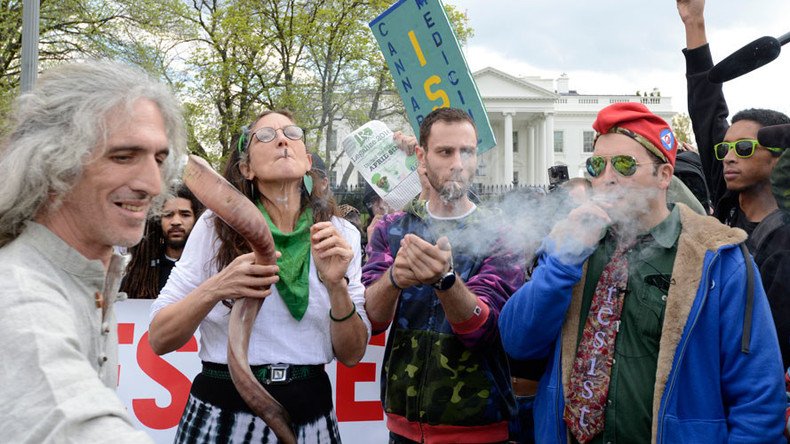Medical cannabis for military veterans passes Congress, heads to Obama’s desk

Military veterans, particularly those suffering from post-traumatic stress disorder (PTSD), may soon get access to medical cannabis in states that allow it after Congress voted to lift a federal ban.
Both the House and Senate approved measures Thursday to block the Department of Veteran Affairs (VA) from enforcing its rule that prohibits its doctors from even discussing the treatment.
Veterans are celebrating the development since they know how medical cannabis offers a natural and less addictive alternative to mainstream prescription drugs, especially painkillers.
Marijuana can treat conditions like PTSD, anxiety, insomnia, and chronic pain.
House passes my amendment, 233-189, to remove restrictions preventing VA doctors from recommending medical #marijuana to qualified veterans!
— Earl Blumenauer (@repblumenauer) May 19, 2016
"From what I hear from veterans is that medical marijuana has helped them deal with pain and PTSD, particularly as an alternative to opioids," said Rep Earl Blumenauer (D-Oregon), who argued for the Veterans Equal Access Amendment.
Up to one in five veterans who served in Afghanistan and Iraq experience PTSD each year, according to VA stats, and 30 percent of Vietnam vets have suffered from the disorder at some stage.
#Congress Votes Yes For Medical #Marijuana For #Military Vets! | Read https://t.co/52vhOZqrfw via @mjdotcpic.twitter.com/vhs1DmfBQ3
— Weedmaps (@weedmaps) May 19, 2016
Veterans get addicted to prescription drugs at a higher rate than civilians.
“Those with multiple deployments and combat exposure are at greatest risk of developing substance use problems,” writes the National Institute on Drug Abuse (NIDA), due to “the stresses of deployment during wartime and the unique culture of the military.”
NIDA reports that pain relief prescriptions written by physicians in the military quadrupled between 2001 and 2009, reaching nearly 4 million.
Maureen McCarthy, deputy chief of patient care services at the VA, discussed veteran patients with an undercover reporter, saying, “It's people that have drug problems, some of which are caused by us and our prescribing.... We also look at the combination of patients on opiates, like morphine and benzodiazepine, like Ativan and Klonopin. …That combination is like candy for some people. ... [T]hey want it, they want it, they want it.”
The VA has been hit with scandals surrounding its treatment of veterans, with health care facilities exposed for falsifying waiting lists, contributing to the death of “more than 1,000 veterans,” CNN reports.
Proud to vote for amendment that makes it easier for veterans to use medical marijuana. Vets should have access to all treatments. #MilConVA
— Congressman Nadler (@RepJerryNadler) May 19, 2016
Since 2004, suicide rates among veterans have increased to an average of 2,500 deaths each year, which NIDA claims are often linked to substance abuse.
Mike Whiter, a former Marine who stopped using prescription drugs for marijuana, told CBS, "I went from being an anxious mess to numbing myself with the pills they were giving me. Cannabis helped me get out of the hole I was in. I started to talk to people and get over my social anxiety."
3. Some veterans say marijuana helps them manage anxiety, insomnia and nightmares: https://t.co/Nj91GYsyvdpic.twitter.com/dcCe24IWB1
— AP Eastern U.S. (@APEastRegion) March 22, 2016
The wars in Afghanistan and Iraq have sent 2.2 million troops into battle, resulting in more than 6,600 deaths and 48,000 injuries.
According to a 2013 report, 30 percent of young veterans are unemployed, double the rate of civilians.
"Today’s Senate and House passage is an encouraging step forward. Bottom line: when veterans walk into a VA facility and talk with their doctor, they should be able to discuss all options available to them," amendment co-sponsor Sen Steve Daines (R-Montana) told the Military Times.
Let's get these Veterans healthy #cannabis treatment!!!
— Eugene Monroe (@MrEugeneMonroe) May 20, 2016
NIDA identifies the military's “zero-tolerance policies and stigma” as well as a “lack of confidentiality” as reasons veterans don’t seek treatment.
The House voted 233-189 in favor of the measure, and the Senate voted 89-8.
Medical cannabis is legal in 24 states and Washington DC.












